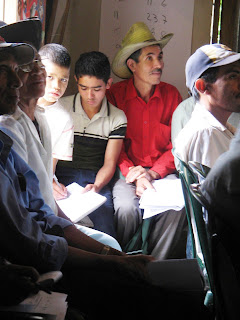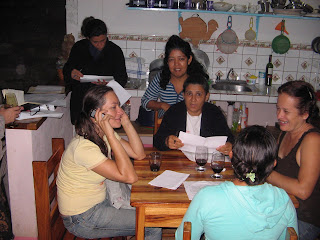 On January 18, Hannah accompanied a group of women to the Hospital in Quilali, as part of her work on behalf of the Women’s Foundation. Quilali is another municipality in the department of Nueva Segovia, 2-3 hours from Jalapa on bumpy dirt roads. We transported the women in one of the converted Land-Rovers that are the Jalapa ambulances.
On January 18, Hannah accompanied a group of women to the Hospital in Quilali, as part of her work on behalf of the Women’s Foundation. Quilali is another municipality in the department of Nueva Segovia, 2-3 hours from Jalapa on bumpy dirt roads. We transported the women in one of the converted Land-Rovers that are the Jalapa ambulances.FMJ coordinates with the Nicaraguan Ministry of Health (MINSA) to bring women who need pap-smear follow up and cervical cancer treatment to the gynecologist in Quilali, as there is not a gynecologist in Jalapa. Women also go to Ocotal, Esteli, and Managua, in extremely grave cases. For the Quilali trips, the Jalapa hospital donates an ambulance to bring the women to Jicaro, a neighboring municipality about an hour and a half away. Ramon Iban, the director of Jalapa’s hospital, coordinates with the hospital director in Jicaro to use one Jicaro’s ambulances for the second leg of the trip.
When we arrived in Quilali, the hospital was nearly empty so they attended to us right away. We were luck with this, as women from the foundation told me stories of waiting up to 5 hours in the hospital before being seen. . . We were also lucky, because the 5 women who went that day didn’t need any major treatments- some just needed a consult on their most recent results, and/or follow up paps. Everything went well; we were blessed with all good news!
 Although I am a stranger and not technically part of FMJ, I felt the women lean on me for support, as I checked them in at the hospital, helped them read (and explain) their results, and had to track down the hospital director in Jicaro, who forgot to tell his staff we could take the ambulance- never taking “no” for an answer- even when I had to personally go to his house and pull him out of bed on a Sunday morning. That is another story in itself, but each step of the way, walking in FMJ’s shoes, I realized how much of a difference their work makes.
Although I am a stranger and not technically part of FMJ, I felt the women lean on me for support, as I checked them in at the hospital, helped them read (and explain) their results, and had to track down the hospital director in Jicaro, who forgot to tell his staff we could take the ambulance- never taking “no” for an answer- even when I had to personally go to his house and pull him out of bed on a Sunday morning. That is another story in itself, but each step of the way, walking in FMJ’s shoes, I realized how much of a difference their work makes.Everyone was relieved on the long ride home, and we passed the time telling stories and discussing our experiences. The women agreed that FMJ’s work was invaluable to their comfort dealing with their health problems, and that they felt personally cared for by the foundation, who hunt them down, making sure they know when their appointments are, and ensure they arrive for them, and coordinating with MINSA to make getting there easier.









